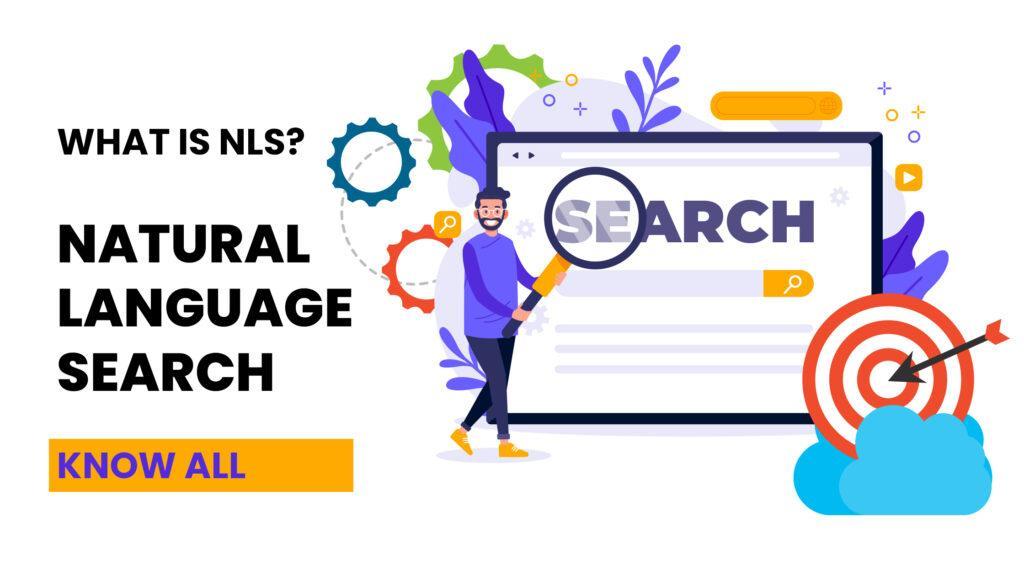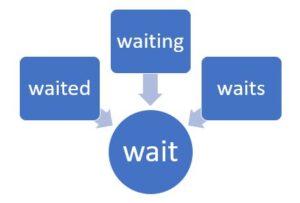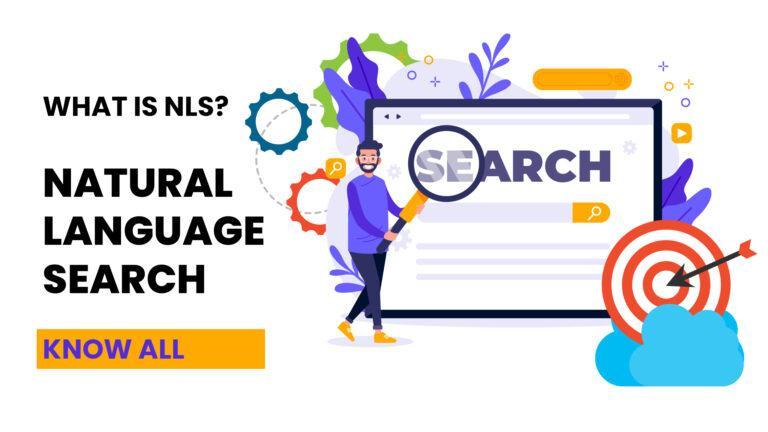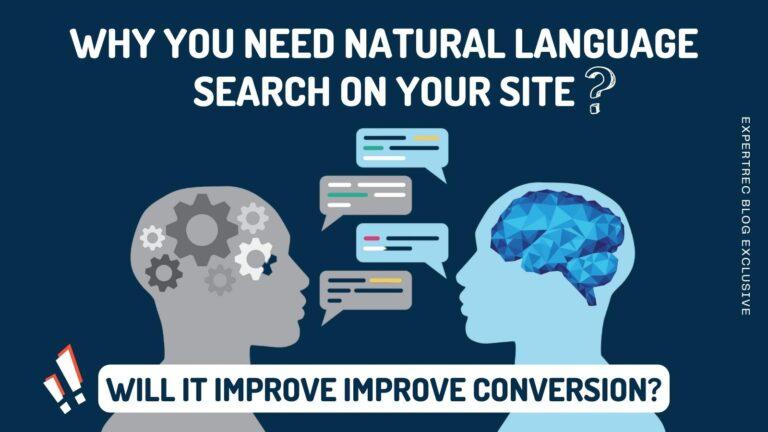What is Natural Language Search?
Natural Language Search is “Using human-like language when searching on a website”. Users can use the full sentences in their native language as if they are conversing with another human being. Also, the computer can simultaneously transform the human-like query into a machine-readable search query.

A Typical example could be something like this
if this query is a natural language search query: ladies shirt with price less than 1k.
This should be converted to the below SQL ( Structured Query Language ) for the computer to process:
select products where sex=women and product_type=shirt and price < 1000
Modern voice assistants like Siri, Alexa have these capabilities built using Natural Language Processing Search.
How does Natural Language Processing Search Work?
Search engines like Google, Bing have evolved to a very advanced level of handling NLP Search queries. NLP uses multiple techniques to identify the topic of the search rather than the keyword of the search using a variety of techniques like
Parsing:
Parsing is splitting the sentences into their components to find their meanings and the important words in the sentences.
Stemming:
Stemming is a process to derive the root word or the stem, the root word as we mean is not dictionary root. Its also called lowering the inflexion in words to their root forms.
According to Wikipedia, inflection is the process through which a word is modified to communicate many grammatical categories, including tense, case, voice, aspect, person, number, gender, and mood. Thus, although a word may exist in several inflected forms, having multiple inflected forms inside the same text adds redundancy to the NLP process.
Hence stemming is employed.
Stemming Example:

Why Stemming is Important?
The English language has multiple variations of the same word. This results in redundancy when developing NLP or ML/AI models which are not efficient. In order to increase the robustness of the ML/AI model stemming is widely used to remove the repetition of words and extract the normalised or root word.
Stemmer in NLTK Example:
PorterStemmer
Martin Porter invented the Porter Stemmer or Porter algorithm in 1980. Five steps of word reduction are used in this method, each with its own set of mapping rules. PorterStemmer() is a module in NLTK that implements the Porter Stemming technique.
https://gist.github.com/neps-in/59cbe6a038aec20d0f8523ac1a6cd3f4
Lemmatisation :
As per Wikipedia
Lemmatisation (or lemmatization) in linguistics is the process of grouping together the inflected forms of a word so they can be analyzed as a single item, identified by the word’s lemma, or dictionary form.[1]
Generally in any language, words appear in one or more inflected forms (In linguistic morphology, inflection is a process of word formation in which a word is modified to express different grammatical categories such as tense, case, voice, aspect, person, number, gender, mood, animacy, and definiteness. The inflection of verbs is called conjugation, and one can refer to the inflection of nouns, adjectives, adverbs, pronouns, determiners, participles, prepositions and postpositions, numerals, articles, etc., as declension.)
For example, Lemmatisation could be something like this, in English, the verb ‘to walk’ may appear as ‘walk’, ‘walked’, ‘walks’ or ‘walking’. The base form, ‘walk’, that one might look up in a dictionary, is called the lemma for the word.
Natural Language Search vs Keyword Search
Keyword Search is a relatively old way of performing a search in Google and search engines in the 1980s.
For eg. To search for the president of the United States. You would query something like “United States President“.
As time progresses these companies have also improvised their search algorithms so that it becomes very easy for users. The users can type in the queries in a natural way as to how they would ask another person.
NLQ version of the same query: Who is the present President of the United States of America.
Search Engines have the ability to parse/understand this query.
Looking for Natural Language Search For E-Commerce / Website?
If you are looking to build a Natural Language Search Engine for your website or your e-commerce website? Certainly its not worth the investment of your cost, time and effort. You can always look for Plug and Play Solutions like ExpertRec Natural Language Search
History of Natural Language Search
The implementation or rather the start of the implementation of natural language search isn’t new to the twenty-first century. They go way back to the earliest days when the internet and the world wide web were introduced. One of the first developments happened in 1993 at MIT’s artificial intelligence laboratory. They developed the START Natural Language Question Answering System. Technically, it was not a search engine on the internet. Instead, it allowed users to search for an encyclopedia online that contained information. It was done by using full natural language sentences. Then again, in 1996, there was the launch of AskJeeves. It is known as the first search engine to allow users to explore the web using natural language, but it was a bit ahead for the period. Very soon, Google launched a keyword search engine. They built a system that had relevance and so much that the results of the competitors didn’t even come close to theirs. Later, after nearly twenty years, Google, along with other search engines understood the value of AskJeeves and tried to further develop the experience.
How Natural Language Search Works
Natural Language uses NLP or natural language processing. It is an advanced technique used in computer science. According to this procedure, huge quantities of data are used to run models of numerical and machine learning. It is done to deduce meaning from grammatically complex sentences. The search has become more practical or attainable due to the Natural Language Search in the past ten years. This has happened due to the collection of loads of data from companies on the internet. This is why the power of computing is at excessive growth- to allow processing of the amount of data collected. The power of natural language search lies in its ability to find meaning by breaking down sentences that depend on context. Like, when a user searches for “what kind of colors would suit my dark skin” the search engine determines that they are looking for colors that would complement their skin tone. If this search is placed on an e-commerce store, it will even show preferred styles and sizes, if there is a history of previous searches or purchases.
Therefore, natural language search isn’t a basic tool anymore to obtain general information. With the advent of voice searches and voice assistants, users are exploring the internet through them.
Benefits of Natural Language Search
Natural Language Search takes the help of NLU or Natural Language Understanding. Some of the major reasons you need NLU on your site are-
NLU can convert your visitors into buyers. When there are visitors to your site, they are probably looking for a specific item. They want a simple approach to looking for what they need instead of having to apply filters. Natural Language allows them to find a particular item without knowing its exact detail. This shortens the time they may have spent on finding the product and can quickly convert the search into a sale.
NLU increases retaining customers by quickly solving queries. The faster your customer finds their results, the more inclined they are to buy from your store. It is like reading between the lines for what the customer exactly wants, which NLU provides.
NLU increases the average value of order(AOV) by recommending personal suggestions. Shoppers are often vague and search for topics like “pink sweater” without any specification for the kind they want. Natural Language Understanding helps to quickly recommend products from the updated inventory matching the suggestion. This increases the order value.
Natural Language Search Examples:
Google.com
The internet’s Search Giant and Pioneer is one of the popular search engine that provides capabilities like Natural Language Search.
Ask.com (originally known as Ask Jeeves) is a question answering–focused e-business founded in 1996 by Garrett Gruener and David Warthen in Berkeley, California.
The original software was implemented by Gary Chevsky, from his own design.
START ( http://start.csail.mit.edu/index.php )
START is surprisingly the first Natural Language Search system, where any users can ask queries about Geography, Science, Arts. It was built by Boris Katz and his associates of the InfoLab Group at the MIT Computer Science and Artificial Intelligence Laboratory.
FAQs
What is Natural Language Search For E-commerce?
E-commerce natural language search is an optimized ecommerce search engine integrated with a natural language search engine. The natural language search allows users to search for products using their mother tongue or native spoken languages like English or French. With natural language search, you can query the database or search bar in your native spoken language or written text to get answers to your quest. The natural language algorithm recognizes the spoken speech syntax, transcribes it to computer language, and displays a result.
Why Is Natural Language Search Important?
Natural language search is an artificially intelligent agent that bridges the gap between users and the computer. It allows users to speak or type into the search bar using their native language or everyday words instead of keywords. Some users need to be computer literate or operate a computer. Natural language AI will help them interact with the computer better. The natural language search also will limit error searches and zero results pages that come from misspelt writing and unknown keywords for products. Natural language search improves a user’s overall experience, making them interact with the computer with little or no effort. The natural language search also solves the problem of a high increase in search engine optimization cost as it reduces the cost of integrating some of the abovementioned issues.
What Are The Components Of Natural Language Processing?
Natural languages consist of two main components; Natural language Understanding and Natural language generation. These components are subdivided into more miniature stages listed below.
Natural Language Generation is creating meaningful phrases and sentences from a given data. It consists of three key stages.
- Text Planning: the retrieval of meaningful texts and contents used for sentence planning.
- Sentence Planning: forming meaningful entire contents and phrases using selected texts. This is where you set the tone of the sentence.
- Text Realization: Charting sentence plans into sentence structures.
Natural Language Understanding: Natural language understanding allows machines to comprehend and interpret human language by removing metadata from content. It analyzes several aspects of language and assists in mapping out inputs into valid data representations. Natural language understanding tasks include
Lexical Ambiguity: This means that one word or sentence holds multiple meanings. For example, “The man is looking for a match.” The sentence is ambiguous as ‘match’ could mean a partner or a football competition.
Syntax Ambiguity: A sequence of words that has more than one meaning. For example, “The goat is ready to eat.” The ambiguity reflects whether the goat is ready to eat its food or if the goat is ready to be eaten by someone else.
Referential Ambiguity: This word or phrase could refer to multiple properties.


